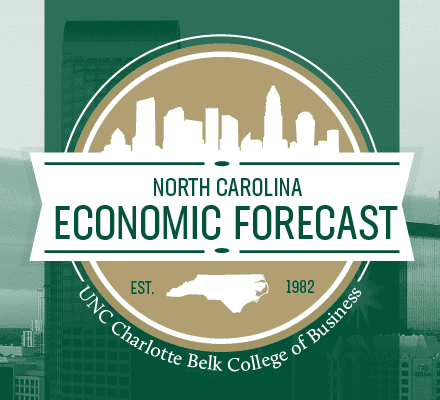UNC Charlotte forecast reveals state economy faces mixed outlook with continued growth, lingering challenges


North Carolina’s economy is projected to see sustained growth through the rest of 2025 and into 2026, but businesses should prepare for uncertainties from federal policy decisions and the state’s recovery from Hurricane Helene. This outlook comes from the latest North Carolina Economic Forecast published by the UNC Charlotte Belk College of Business.
North Carolina’s Gross Domestic Product, a key measure of economic activity, is forecast to increase by 2.3% in 2025. This will mark the fifth consecutive year of growth since COVID-19. The state is expected to add 76,400 net jobs in 2025, increasing employment by 1.5% by December.
While the state’s economy continues to tick along, there are concerns, said Charlotte financial economist John Connaughton, author of the state forecast for nearly 45 years.
“In addition to fiscal policy concerns, we have seen the U.S. unemployment rate rise from 3.3% in May of 2023 to 4.3% in August of 2025,” Connaughton said. “As a result of the weakness in the labor market, the Fed began reducing interest rates in September of 2024. By December of 2024 the Fed Funds rate dropped by 100 basis points.”
Depending on economic data, the Federal Reserve could continue with interest rate reductions by up to another 75 basis points by the end of this year, he said.
“However, if Congress does not begin to control fiscal spending, we are likely to see a return of inflation in 2026, which could disrupt the Fed’s plans,” he added.
Several sectors are driving this year’s growth. Agriculture is projected to see an economic growth rate of 34%, followed by information at 7.3%, retail trade at 3.1%, government at 2.8%, educational and health services at 2.6%, nondurable goods manufacturing at 2.6% and construction at 2.5%.
In terms of employment, sectors leading the way are construction at 3.6% and education and health services at 2.8%. However, some sectors, including mining; transportation, warehousing and utilities; and durable goods manufacturing, are expected to decline in output or employment in 2025.
Navigating uncertainty in the coming year
Looking ahead to 2026, North Carolina’s real GDP is forecast to increase by 2.1% over 2025, reaching $933,820.1 million, marking the sixth year of growth since COVID-19. All 15 of the state’s economic sectors are expected to experience output increases in 2026. Information at 3.9%, agriculture at 3.8%, mining at 3.5% and construction at 2.6% are the sectors with the strongest anticipated growth.
The state is expected to add 80,850 net jobs, a 1.6% increase. Employment growth is expected to be strongest in information at 5.5% and education and health services at 4.9%. However, the state’s unemployment rate is likely to increase to 4.1% by December 2026, up from 3.7% in August 2025.
For the business community, several critical factors demand close attention, creating a sense of urgency.
Federal Reserve Policy: The Federal Reserve has sent uncertain signals about its interest rate policy following three reductions in late 2024. While the Fed could cut rates by another 50 to 75 basis points by the end of 2025, this depends heavily on incoming economic data. This uncertainty impacts borrowing costs and investment decisions for businesses.
Inflation Risks: There is a 60/40 chance of inflation returning, Connaughton said, warning that if Congress doesn’t control fiscal spending, inflation could return in 2026.
Tariffs: Connaughton identifies tariffs as a significant wild card that could further slow the economy and cause a short-term bump in inflation.
Hurricane Helene Recovery: The prolonged recovery in Western North Carolina, exacerbated by the widespread lack of flood insurance, will continue to impact the state’s overall economic performance.
“The economic data over the next several months will play a pivotal role in determining Fed interest rate policy and the balance between a return of inflation, a slowdown, a recession or a boom,” Connaughton observed.
The time-tested comprehensive North Carolina Economic Forecast from UNC Charlotte provides valuable insights for the business community to anticipate future economic conditions and strategically adapt to both the opportunities and challenges ahead.